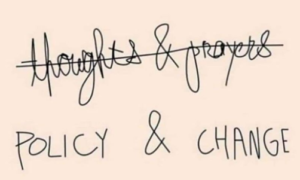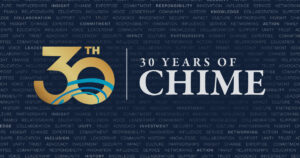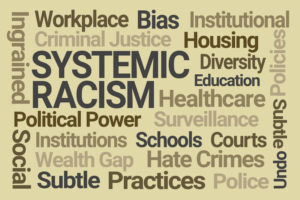We are all asking when is it enough? Parents of young children are struggling with how to talk to their children, how to keep them safe. The mass shootings in Buffalo and Uvalde are the latest horrific examples of gun violence and hate in this country.
examples of gun violence and hate in this country.
I have been struggling to find the right words. There are none. Yes, thoughts and prayers for all the victims, their families, and communities are needed. May they find the strength to carry on in the very difficult days ahead. But what’s needed in this country is action and policy change, not just more thoughts and prayers.
I read two pieces that have helped me to express what I’m feeling.
Michael Dowling, President and CEO of Northwell Health, is a progressive voice amongst healthcare executives. He doesn’t shy away from taking a stand on difficult issues and very clearly names gun violence as a public health issue. Under his leadership, Northwell established The Gun Violence Prevention Learning Collaborative for Health Systems and Hospitals, a grassroots initiative that gives healthcare professionals the space to have open dialogue about the impact of gun violence, share best practices and collectively take action. This piece in Becker’s Hospital Review describes his call to action – “Michael Dowling: ‘Every single US hospital leader should be screaming about what an abomination this is’”.
Arika Lycan posted on LinkedIn a piece that frames not just the murder of innocent elementary school children but all the ways that our rights are under attack – “Who is going to do something about this?!” I am, You are, We are.” Arika is a consistent voice for social justice. I am grateful to be collaborating with them and the entire CHIME Diversity, Equity, and Inclusion Committee to continue to educate and raise awareness with our health IT colleagues.
We can’t let Buffalo and Uvalde move out of the news cycle and be forgotten. We need to speak up, show up, donate our time and money, and vote for candidates at all levels of government who support our values. The 2022 mid-term elections are consequential. Know what candidates stand for and vote your values. And consider volunteering some of your time to do phone / text banks for critical House and Senate races in other states.
I admit that I don’t have anything truly new to say today. I have written numerous posts after similar events rocked us to the core, and I have said it all before. So, I’m sharing my “Hate has no place” post again. If you don’t want to read it again or even for the first time – here’s my bottom-line message:
We must speak up for love and justice every chance we can. We must challenge those who hate and divide us as a people. And we must vote for the kind of leaders that we are willing to trust the future of our children and grandchildren to. Please join me.
Hate has no place (written August, 2019)
The most recent horrific mass shootings are not due to video games, the Internet, nor mental illness. There are more guns in the United States than people. Let that sink in.
Hate speech, racism, and white supremacy exist and are tolerated by some of our elected leaders who are supposed to keep us all safe. Let that sink in.
This is not who we want to be as a country. It is time for responsible, moral leaders to act. Continue reading →









